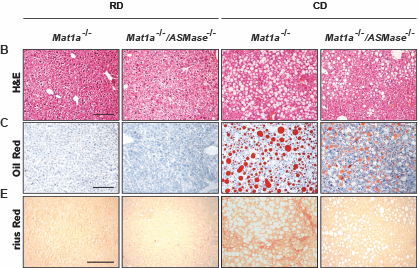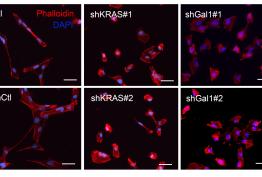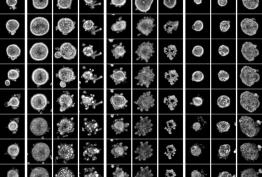The liver plays a major role in the metabolism of methionine and disruption of this pathway is associated with chronic liver disease. Methionine uptake in the liver is metabolized to S-adenosylmethionine (SAM), an essential methyl donor involved in the methylation of a wide range of biomolecules, including DNA, proteins and lipids, which is generated by MAT1A. Downregulation of MAT1A with subsequent depletion of SAM in mice and humans leads to steatohepatitis. Acid sphingomyelinase (ASMase) activation generates ceramide in specific site(s), which has been reported to promote hepatocellular apoptosis and fibrosis. In the context of fulminant liver failure, it has been shown that ASMase downregulates the mRNA of MAT1A and sensitizes to TNF-induced hepatitis. However, the regulation of ASMase by MAT1A has not been previously examined.
In a new study, the group of “Mitochondrial regulation of cell death” with Cristina Alarcon-Vila como primera autora and coordinated by Jose C Fernandez-Checa and Carmen Garcia-Ruiz, examined the regulation of ASMase in dietary and genetic models of disruption of methionine metabolism and Mat1a depletion. The data indicate that Mat1a deletion leads to the activation of ASMase and its pharmacological and genetic targeting protects against alcoholic (ASH) and non-alcoholic steatohepatitis (NASH). Moreover, liver samples from patients with ASH and NASH exhibit an inverse correlation between MAT1A and ASMase mRNA levels.
This basic and traslational investigation reports a novel mechanism of regulation of ASMase by Mat1a deletion through lower SAM/SAH, and establish the reciprocal regulation between the disruption of methionine metabolism and ASMase activation, indicating that both events engage in a self-sustained loop of relevance for alcoholic and nonalcoholic steatohepatitis. The study uncovers a novel conceptual link between MAT1A and sphingolipid metabolism via ASMase activation of relevance for human ASH and NASH.
Paper: Cristina Alarcon-Vila, Naroa Insausti, Sandra Torres et al., Dietary and genetic disruption of hepatic methionine metabolism induce acid sphingomyelinase to promote steatohepatitis. Redox Biol 2023 Feb;59:102596. doi: 10.1016/j.redox.2022.102596







